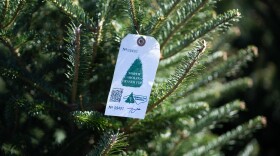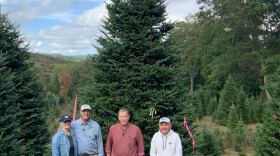Christmas trees begin here, clinging to five-by-five foot patches of ground on the side of a soil-covered hunk of granite in the Blue Ridge Mountains. The slope dips down several hundred feet below where we’re standing. Fraser Firs of all shapes and sizes surrounded by Dutch white clover covers the landscape.
“Do you see why they call it Smokey Holler?” asks Della Deal. “It’s a beautiful place up here.”
Deal lives with her husband Buddy and their three kids back down the other side of the hill. This is their farm – the Smokey Holler Christmas Tree Farm.
On a clear, bright day you can see Virginia from up here. Cars whisk by on the nearby Blue Ridge Parkway, close enough you can see them, but far enough away that you can’t hear them. It’s as peaceful and serene a setting as one can imagine.
Beautiful late fall days like this one are more than just pretty to look at in Christmas Tree country – it means a lot of work can get done.
“We work six days a week from July through October,” explains Della. “But this time of year is seven days a week. You just work until you get it done.”
North Carolina is second in the country in Christmas Tree production, behind only Oregon. It's a $100-million-a-year industry in the state.
The Deals are among the 1,500 Christmas Tree farmers in North Carolina. Most live in this four-county area of Allegany, Ashe, Avery, and Watauga counties. North Carolina is second in the country in Christmas Tree production, behind only Oregon. It’s a $100-million-a-year industry in the state.
Most of the Christmas Tree farms are family-owned. Della’s parents have been tree farmers since the 1950s.
“Growing Christmas Trees really saved the small, family farms up here,” she says. “Most folks were producing beans and cabbage and those markets went away as all that agriculture moved out west to larger farms. Christmas trees really filled that void and saved a lot of these small farms.”
An average Christmas tree takes 13 years to grow.
It gets put into the ground when it’s five years old and then grows a foot a year. Fraser firs do especially well in the North Carolina mountains due to the high elevation, cool summers, plenty of rainfall, and well-drained soils.

Each tree gets trimmed, fertilized, shaped, and otherwise cared for approximately 100 times in its lifetime.
“Our biggest problem compared to other agricultural crops is how labor intensive it is,” says Earl Deal. He’s a former forest biomaterials professor at NC State and the patriarch of the family. He’s in his 70s but still gets up at 4am every day to hand-shape every tree.
Much of the labor is in the fall comes from immigrant workers. The Deals participate in the H2 guestworker program, flying dozens of legal temporary workers in from Mexico and housing them on the farm. After the work is done, the workers go back home to their families.
“It’s very hard to find people willing to do this kind of labor, to load one of those 9-to-10 foot trees, it may weigh 130 pounds,” says Buddy Deal. “And those guys pick ‘em up and load ‘em one after another after another, until we’ve loaded 50,000 trees. So it’s unpleasant.”
The Deals hope changes to immigration laws would make it easier to employ legal workers.
Environmental concerns are changing their industry, as well.
A decade or so ago, customers began asking about organic trees. Della took it upon herself to grow some, spending countless hours fine-tuning the process. This year, their first organic trees are hitting the lots.
“I’m not totally sold on organic,” says Della. “I think it’s more of a marketing tool than it is an actual environmental practice. We still have to use organic pesticides on those trees to keep the mites out. And we use a whole lot of chicken litter to fertilize them.”
'A fake tree is made of plastic and once it's thrown away it just goes into the landfill. It doesn't have any environmental benefits like the creation of oxygen or the creation of habitat for wildlife or anything.'
Other concerns are more immediate.
More and more buyers think cutting down a live tree and putting it in their living room is not environmentally sound, and have opted for fake trees.
“Well, it’d be better for the environment if we didn’t even celebrate Christmas, now wouldn’t it?” says Jill Sidebottom, a Christmas tree extension agent at NC State. “We wouldn’t have presents and wrapping paper or anything. A fake tree is made of plastic and once it’s thrown away it just goes into the landfill. It doesn’t have any environmental benefits like the creation of oxygen or the creation of habitat for wildlife or anything.”
After our tree is cut down at the Smokey Holler tree farm, it’s hauled to the distribution center. It’s a one-lane loading zone hard by a mountain creek and ringed by large white pines – specific choices made by the Deals to keep the trees cool and damp after they’re cut. There’s also an elaborate canopy of tarps tied to the white pines, covering the trees until they are ready to be put on a truck.
The 18-wheelers run constantly in and out of here, from early November to mid-December. The biggest trees go to churches in Florida and mansions in New Jersey.
Ours is loaded up with a few hundred others and heads out to the Cranberry Tree Farm retail lots around the Triangle. There, they will be bought, loaded onto minivans, taken into living rooms, and decorated.
After the holidays, recycled trees are used as compost or even hauled out onto the beach, to use to shore up dunes.
About that same time, somewhere in the Blue Ridge Mountains, Earl Deal will wake up in the dark at 4am and head out into the cold, thin air and do the hand-trimming, getting ready for next year’s batch of trees.








